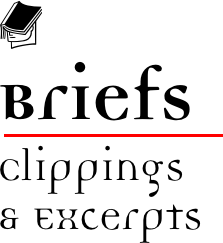 |
||||||||||||||||||||||||||||||||||||||||||||||||||||||
 |
||||||||||||||||||||||||||||||||||||||||||||||||||||||
 |
||||||||||||||||||||||||||||||||||||||||||||||||||||||
from:
The New York Times Magazine/11.18.07
Mind of a Rock Is Everything Conscious? by Jim Holt
Most of us have no doubt that our fellow humans are conscious. We are also pretty sure that many animals have consciousness. Some, like the great ape species, even seem to possess self-consciousness, like us. Others, like dogs and cats and pigs, may lack a sense of self, but they certainly appear to experience inner states of pain and pleasure. About smaller creatures, like mosquitoes, we are not so sure; certainly we have few compunctions about killing them. As for plants, they obviously do not have minds, except in fairy tales. Nor do nonliving things like tables and rocks. All that is common sense. But common sense has not always proved to be such a good guide in understanding the world. And the part of our world that is most recalcitrant to our understanding at the moment is consciousness itself. How could the electrochemical processes in the lump of gray matter that is our brain give rise to—or, even more mysteriously be—the dazzling technicolor play of consciousness, with its transports of joy, its stabs of anguish and its stretches of mild contentment alternating with boredom? This has been called “the most important problem in the biological sciences” and even “the last frontier of science.” It engrosses the intellectual energies of a worldwide community of brain scientists, psychologists, philosophers, physicists, computer scientists and even, from time to time, the Dalai Lama. So vexing has the problem of consciousness proved that some of these thinkers have been driven to a hypothesis that sounds desperate, if not downright crazy. Perhaps, they say, mind is not limited to the brains of some animals. Perhaps it is ubiquitous, present in every bit of matter, all the way up to galaxies, all the way down to electrons and neutrinos, not excluding medium-size things like a glass of water or a potted plant. Moreover it did not suddenly arise when some physical particles on a certain planet chanced to come into the right configuration; rather, there has been consciousness in the cosmos from the very beginning of time. The doctrine that the stuff of the world is fundamentally mind-stuff goes by the name of panpsychism.... |
||||||||||||||||||||||||||||||||||||||||||||||||||||||
from:
Garner’s Modern American Usage by Bryan A. Garner Copyright © 2003 Bryan A. Garner Oxford University Press
lay; lie ...The Distinction
Very simply, lie (=to recline, be situated) is intransitive—it can’t take a direct object <he lies on his bed>. But lay (=to put down, arrange) is always transitive—it needs a direct object <please lay the book on my desk>. ...
Because lie is intransitive, it has only an active voice <lie down for a while>. And because lay is transitive, it may be either active <he laid the blanket over her> or passive <the blanket was laid over her>.… To use lay without a direct object, in the sense of lie is nonstandard <I want to lay down> <he was laying in the sun>. But this error is very common in speech—from the illiterate to the highly educated. In fact, some commentators believe that people make this mistake more often than any other in the English language. Others claim that it’s no longer a mistake—or even that it never was. But make no mistake: using these verbs correctly is a mark of refinement. The most unusual of these inflected forms, of course, is lain, but most writers have little difficulty in getting it right—e.g.: • “Katrina Kurasti said she and her husband, Dan, had just lain down in their bedroom when the bomb went off around 10:45 p.m.” Mack Reed, “Pipe Bomb Rips Car, Jolts Simi Neighborhood,” L.A. Times, 30 April 1994, at B9. • “Prosecutors later claimed the witness had lain down next to two of the murder victims, expecting to die.” Tom Jackman, “Witness in Three Murder Cases Pleads Guilty to Conspiracy,” Kansas City Star, 28 June 1994, at B1.
p. 486 |
||||||||||||||||||||||||||||||||||||||||||||||||||||||
EACH WEEK we scan ads from an actual catalog, a catalog selling junque. (That's junk with cachet.) These ads are real. Maybe they don't seem real, but they are. This week We again include items from the Gaiam "Harmony" catalog. That is spelled correctly, G-a-i-a-m. Gaia (as in “earth”) plus an "m" sound as in “Om,” maybe, as in, you know, "Ommmmm." Bliss, etc. Gaiam. You are allowed and even encouraged to peruse all the items below, but may I call your attention particularly to two of those essentials. First, the "Miracle Foot Massager" and that business about "70,000 nerve endings in your feet plus trigger points that correlate to your whole body." As in "reflexology." Here's a link about that, called, oddly enough, Reflexology link. And the other essential below is the "Stone Massage Set." Without considering the matter of its effectiveness, may I simply ask, How you get them stones on your back? You throw them stones? What if you conks yourself in the head while trying to get them on your back? And can't you hurt yourself with a strain or something, lying there on your stomach trying to get them stones to line up on your back? Hot stones? Guess you need somebody else to help you. Like a slave. And as a laginiappe (we're known for that around here) how about the "New emWave"? Why that thang, let's see, "trains you to re-balance several key systems: nervous, cardiovascular, hormonal and immune." Well, damn. I need me one of those. |
||||||||||||||||||||||||||||||||||||||||||||||||||||||
 |
||||||||||||||||||||||||||||||||||||||||||||||||||||||
 |
||||||||||||||||||||||||||||||||||||||||||||||||||||||
 |
||||||||||||||||||||||||||||||||||||||||||||||||||||||
 |
||||||||||||||||||||||||||||||||||||||||||||||||||||||
 |
||||||||||||||||||||||||||||||||||||||||||||||||||||||